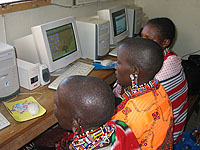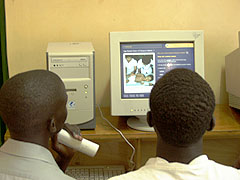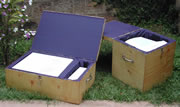|
by Kate Mayer
Did I tell you we now have 15 kids? My husband’s two brothers died (of AIDS) and left 4 and 7 kids respectively. They all are between age 19 and 4. The mothers are ailing (HIV). Now we have to take care of them, making sure they get their medication, then we have to feed them and ensure the kids get an education. And one of the kids is also HIV+. My mother-in-law is a widow and she has been our responsibility ever since I can remember. It’s really tough. . . . .
— From a mother in Kenya
This family is just one of many who have been hit hard in Africa. The AIDS epidemic strikes families in many tragic ways. There’s not only the loss of a loved one, but also the scrambling to care for the survivors. The economic devastation increases as the death toll rises. Education is a crucial first step in combating HIV/AIDS. People—and especially young people—need accessible and accurate up-to-date medical information about HIV/AIDS prevention and treatment issues. A successful prevention program is the most cost-effective way to slow the growth of AIDS in Kenya and other countries worldwide.
Renewing CHICs in Kenya

This month, WiRED launches a special fundraising campaign to renew its successful prevention program in Kenya by refurbishing four Community Health Information Centers (CHICs) in and around Nairobi. WiRED plans to enhance its prevention program in Kenya with new computers and educational material. The highly successful program, operated in partnership with grassroots organizations, enables local people to use interactive computer programs to learn the prevention message. The sites will serve several million people and offer researchers a chance to study the effectiveness of the program. Building on the popularity of the original programs, these centers will also serve as models for those interested in expanding the program to other areas of Kenya and to other African countries.
A Brief History
Beginning in 2001, WiRED developed a network of 19 CHICs in Kenya over a four-year period with funding from a U.S. National Institutes of Health developmental grant. The centers provide health information on many topics including HIV/AIDS, cardiology, diabetes, malaria, TB, and other diseases and health issues. Offering direct education to grassroots populations through extensive information libraries and specially designed courses on computers, the centers have been very popular and avoided the stigma of being solely an HIV/AIDS information resource.
Why Computers?

Computers have the advantage of offering interactivity and hold people’s attention (especially young people’s) longer than other formats. “Give a young person a brochure, and you have his attention for two minutes,” observed a WiRED worker who helped set up the first centers. “Give him the information on a computer and you’ll have his attention for two hours.” The other great advantage of the CHIC proram is that it combines the computers with trained staff members who are available to answer questions and guide people in the use of the computers. Further, they provide referral advice to local clinics and health care service centers.
An Ounce of Prevention
Entire communities plan and operate the CHIC facilities. Each CHIC adapts its content and operations to local needs, customs, and languages. This will be especially important in some areas, like Kibera, where the community has its own microculture. Each CHIC formally partners with a local community-based organization (CBO), which provides space, electricity, and management of the staff. WiRED provides healthcare content, computer equipment, maintenance, staff stipends, and administrative support.

Pack 'N Go Computer
Trained assistants from the local community staff each center, which is outfitted with computers and professionally developed, interactive programs designed to supply self-paced, age-appropriate healthcare information in an engaging format. The staff also connects with local hospitals and medical personnel, and implements an outreach program, called Pack ‘N Go. Here, staff members take computer information to schools, churches, and community centers within a 30-mile radius of each CHIC—creating ever-widening ripples of prevention knowledge.

Staff duties include demonstrating use of equipment, counseling visitors and, where appropriate, directing visitors to voluntary counseling and testing centers. Targeting youth and young adults, the program also attracts a larger segment of the community. WiRED’s CHIC program is highly interactive, versatile, nonjudgmental, cost-effective, comprehensive, and targeted for its various audiences. Prevention information is age-sensitive; the centers often work with “living positively clubs,” which provide information and emotional support to those living with HIV.
Until We Find a Cure
The program’s success arises from an effective integration of computer-delivered information and human staff intervention. No matter how you measure it—in the cost of money spent, of human lives, of social stability—prevention is a far better bargain than treatment. Although this program assists people who are HIV-positive, its great strength is its capacity to promote healthy lifestyles that prevent disease.
Editing by Annie Stuart, layout by Brian Colombe.
^ Back to the Top
|



